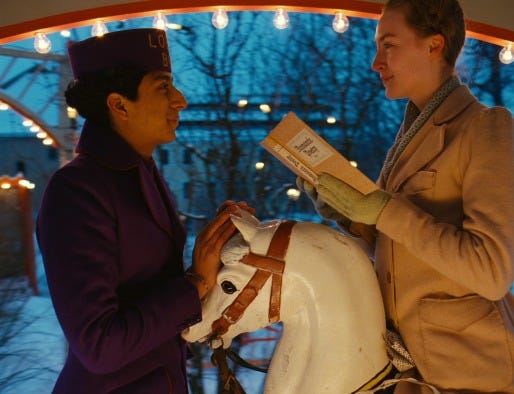The Grand Budapest Hotel

Wes Anderson's films have the feel of a retro storybook with their symmetrical composition, timeless narrative structure and the most complex and detailed simplicity. No actor can get away without delivering at least one bit of dialogue while staring straight ahead, and each character functions in a sort of existential Disneyland. In Anderson's last film, "Moonrise Kingdom," I found all of the above to be quite literally the cure for my insomnia. In "The Grand Budapest Hotel," Anderson has found a pitch-perfect mix of dark comedy and a quiet sense of optimism.
This time around, there aren't really any precocious moppets with dry delivery and misplaced gloom. Instead, Anderson finds a likable protagonist in Zero (Tony Revolori, in an impressive film debut), an earnest lobby boy eager to make good in an elegant hotel that appears to thrive despite the war-torn atmosphere. (Note that the word "Nazi" is never mentioned.) Zero finds a champion in his employer, Gustave (Ralph Fiennes), a mustachioed charmer who's at once completely open and charismatically enigmatic. The ever-suave Gustave's predilection for much older women soon lands him in deep trouble, and Zero finds himself pulled along for the journey. The results involve an erotic painting, bloody train rides, pink cake boxes and Jeff Goldblum.
In "Budapest," Anderson's unique aesthetic, the effects of which have ranged from charming ("Rushmore" and "The Royal Tenenbaums") to unwatchable ("The Life Aquatic with Steve Zissou") finds a happy home in obscure, graying Eastern Europe. As sweetly compatible as Zero and his young lover, Agatha (Saoirse Ronan), Anderson and the landscape are an excellent blend of decaying and decadent. The setting and the darkness it lends itself to keep the film from falling into the cloying trap of "Moonrise Kingdom," but incorporates humor much more effectively than "The Life Aquatic."
Anderson's usual suspects all make appearances: Owen Wilson, Bill Murray, Jason Schwartzman and the like all pop up in various cameos. Edward Norton is back as a bumbling soldier, and Jude Law a surprisingly subdued writer and hotel guest. Harvey Keitel and Willem Defoe have small but memorable turns as a gruff prisoner and a near-mute hit man, and of course Goldblum mumbles and fumbles as only Goldblum can. But it's Fiennes who elevates "Budapest" from good to great. His Gustave is unpredictable and over-the-top, articulate and witty in one breath, cursing a blue streak the next. He's a "character" in every sense of the word, yet remains grounded in this bizarre reality.
During a Q&A following the screening I attended, Anderson revealed that "Budapest" was inspired by the writings of Stefan Zweig, who, as a child, escaped the horrors of World War I only to commit suicide with his wife in 1942. This may explain why the film has such a haunted beauty, a weight despite the usual Anderson tropes that keeps it from descending into overly cute. Whatever you're doing, Anderson, it's working. Keep it up.
[youtube http://www.youtube.com/watch?v=zru-1DbbcsA&w=514&h=315]



